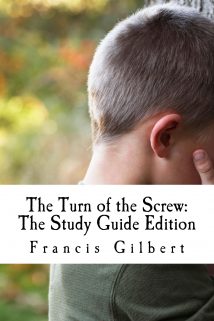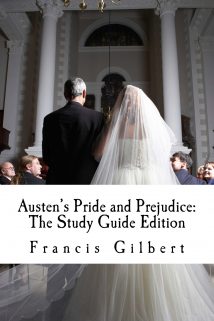A-level
-
Brontë’s Wuthering Heights: The Study Guide Edition
Aimed specifically at pupils reading the book for exams. The complete text is punctuated by analysis and questions on every chapter with answers provided at the back. Essential reading for all students and teachers!
-
Mary Shelley’s Frankenstein: The Study Guide Edition
This edition of Shelley’s classic horror novel contains a comprehensive study guide, as well as extensive questions for students to help their understanding. Buy the paperback, and you get the e-book for free, so you can use the embedded web links.
-
Austen’s Pride and Prejudice: The Study Guide Edition
Aimed specifically at students and teachers reading the book as an exam text, with a detailed introduction that outlines the historical context of the novel, the ways in which it was influenced by the other genres/writers and how it is structured.
-
My blogs, YouTube, Soundcloud and Twitter channels…
Together with a number of other eminent journalists and educationalists, I co-founded and help run the popular educational blog, Local Schools Network. I also blog for Mumsnet on Tales Behind The Classroom Door. My YouTube channel is Wonderfrancis. My Soundcloud Channel is Electric Schubert. I am @wonderfrancis on Twitter. Other blogs: A Streetcar Named Desire for […]
-
Academics and teachers, have you met?
Reform would be smoother and more effective if you worked together, says Francis Gilbert Earlier this month, education secretary Michael Gove said that top academics should reform our A-level system, implying that only the elite Russell Group universities can stop the chronic “dumbing down” going on in our sixth forms. His announcement was on top […]
-
An introduction to A2 Media Studies OCR, Collective Identity
Task: Devise your own Prezi which explores all the groups you feel a part of and which ones you feel define you, and which definitely do NOT. My collective identities on Prezi
-
Media Studies: John Dunford, Head of Media Studies, and student blog links.
The Head of Media Studies at my school has his blog here. It is full of useful links and information. A2 students: http://linhamr3m4.wordpress.com/ http://danielbmedia.wordpress.com/ http://alexoconnor2.wordpress.com/ http://missemilystevens.wordpress.com/ http://joannebones.wordpress.com/ http://www.lukedarlingslifeblog.blogspot.com/ http://mollycliftona2.wordpress.com/ http://rachelhelsby2.wordpress.com/
-
Five reasons why Media Studies is a great subject
I used to be a bit sceptical about the whole idea of Media Studies until I started teaching it at A Level. The process of choosing a suitable syllabus (we opted for OCR), devising schemes of work and delivering the lessons over the last few years has now convinced me that it should be an […]
-
Standardisation: presentation ideas and presentation on processes of semantic change, taboo words
Presentation format: On PowerPoint: give some history and a task for pupils to do. All presentations must include some definitions on standardisation. Ask FGI for help if necessary. Devise a presentation on how spelling was standardised, the development of printing, dictionaries, mass education. Devise a presentation on STANDARD ENGLISH and […]
-
The changing discourses connected with health
Starter activity: brainstorm the times when you were ill when you were a child. What did your carers say to you in connection with your illness? What are your memories of your first trip to the doctors, to hospitals? What language did people use to describe your illnesses etc? What did they say to comfort you? Learning […]
-
Romeo and Juliet: Exam questions on Romeo and Juliet for revision
Romeo and Juliet essay questions1. To what extent do you think Mercutio and his death is to blame for the tragedy that ensues after his death? 2. Shakespeare’s presents fate as playing a vital part in the death of the lovers. To what extent does he convinces the audience that fate plays a central role […]
-
Romeo and Juliet: Exam questions on ‘Romeo and Juliet’ with page references for quotes
Exam questions on ‘Romeo and Juliet’ with page references for quotesComplete some detailed plans of the following questions which are grouped around the key themes of the page, the page references give you an idea about where to find your key quote but you MUST find it for yourself! Youth And Age To what extent […]
-
Year 13: Useful websites for Child Language Acquisition
Should you want further reading on language acquisition, these websites are very helpful and explain all the relevant hypotheses and theories:http://en.wikipedia.org/wiki/Language_acquisition http://home.cogeco.ca/~monicafitz/theories.htm http://www.alphadictionary.com/articles/ling001.html
-
Useful grammar exercises
Log onto: http://www.ucl.ac.uk/internet-grammar/exlist/exlist.htm
-
Social Contexts and Child Language Acquisition
Read the following two articles from the Daily Telegraph and write about whether you think that children’s changing environment is affecting their language for better or worse. Use evidence from your own investigations and research. Teacher and class notes have been added in CAPITALS. Not on Speaking Terms: Why do many children lack basic language […]
-
Year 13: STUDENT ANSWER JUNE 2007 Question 1 Unit 6 — Child Language Acquisition
Lexical Choice It appears that Ewan becomes a bit worried that he will cause Holy to drop out of their role play game, due to his aggressive tone. He repeats the proper noun ‘Holly’ in order to grab her attention and says the verb ‘playing’ once again using a declarative where he should be using […]
-
Revision questions for Language Acquisition Unit 6
1. What are the Assessment Objectives for this subject? Summarise them briefly, and highlight the AO with the most marks.2. What aspects of the systematic framework do you have to use in this exam? Write out a list and say why they are important. 3. Why is it important to study Child Language Acquisition? 4. […]
-
Notes on Child Directed Speeches, Children’s grammar, theories of language acquisition
Child-directed Speech • “Even four year olds adjust their language when speaking to a two year old. The way that adults talk to babies is similar to the way they talk to dogs. (Hirsh-Pasek and Treiman, 1982) • Child-directed speech aims to: 1. attract and hold the baby’s attention; 2. help the process of breaking […]




